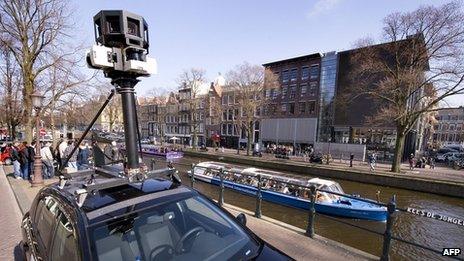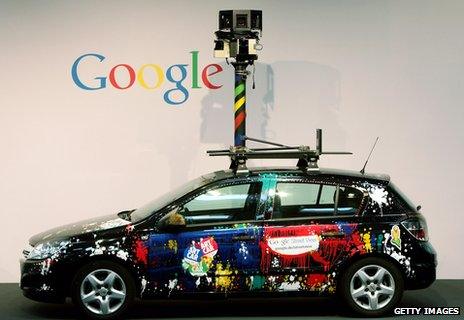Google Street View - a closer look
- Published
- comments
Rory Cellan-Jones talks to Google's Luc Vincent about the refreshed Street View service
It is nearly four years since Google's Street View arrived in the UK, and now it is getting a major revamp. The Street View cars have been roaming Britain, refreshing the coverage in the big cities and bringing new images to remote places, such as the Isle of Lewis.
The latest version has added another 15% of the UK's roads, bringing the total covered to 65%. And by using backpacks with lightweight recording equipment the company has brought the service to new places, from the interiors of buildings like the BBC Radio 1 studios to the towpaths of canals. But what do we now think about this close-up view of our streets, a project which has been marked by controversies over privacy?
I've been talking to the man behind Street View, Luc Vincent - via the rather clumsy medium of a Google Hangout - and asking him about the project's ambitions. (Our edited interview is above - but you can see the full version here, external). He started by stressing that his boss Larry Page had come up with the original idea, roaming the campus of Stanford University taking pictures.
It had then turned into Luc's 20% project - the blue sky ideas Google engineers are encouraged to work on for a fifth of their time - and had been launched in five US cities in 2007. Now it has mapped large areas of the world at street level. Forty seven countries now have coverage, and the cars have driven five million miles.
But how useful is it? I've always suspected that many people use it once to look at their own house - and then forget about it. Luc Vincent says it is true that much of the traffic is local, but he insists it has become a very attractive service: "People use it to preview the restaurant they want to go to, or choose a vacation spot or search for real estate," he told me.

But when it launched in the UK, while some were fascinated, others were appalled at what they saw as an invasion of their privacy by a Big Brother American business. In the village of Broughton, near Milton Keynes, residents chased a Street View car away, and accused Google of trying to peer through their windows, external.
In Germany, the reaction was much stronger, with entire streets blanked out as residents rebelled against the idea. Google has stopped taking images there, so that some big cities have coverage but elsewhere there is nothing.
Luc Vincent seems bemused by this kind of reaction. "I think the Big Brother aspect is really overstated," he says, "it's not we are driving in one place at one time, it's not like a camera is pointing at you all the time."
The other controversy which surrounded Street View was the discovery that some of its cars had been collecting data from unsecured wi-fi networks. Mr Vincent says that did cause harm to the project: "It certainly slowed us down quite a bit," he says, "we've done what we can to fix the problem, we don't collect any wi-fi right now."

In the UK, at least, the privacy row seems to have abated. When I looked on Street View the village of Broughton was there in full glorious detail, and I could not spot any homes that had been blanked out. And when I contacted a couple of residents they no longer seemed too concerned: "We've moved on," one person told me. It seems the bigger issue there now is getting proper broadband.
Nevertheless, I do sense a wider disquiet about the growing power of Google in so many areas. Many of its services - like Street View or the mobile operating system Android -seemed to have no obvious commercial purpose when they are launched. Executives like Luc Vincent would have us believe that the only motivation is to give as many as people as possible useful information, with any thought of profit a long way down the road.
But look at China's concerns this week about the dominance of Android - a worry shared by some global telecoms operators - and recent concerns about the way the company scans Gmail to serve users relevant adverts. No longer is the world content to assume that the search giant's motives are always pure.
Google's mission to organise the world's information takes another step forward with the expansion of Street View. But the more closely they watch us, the more we may need to keep a critical eye on them.